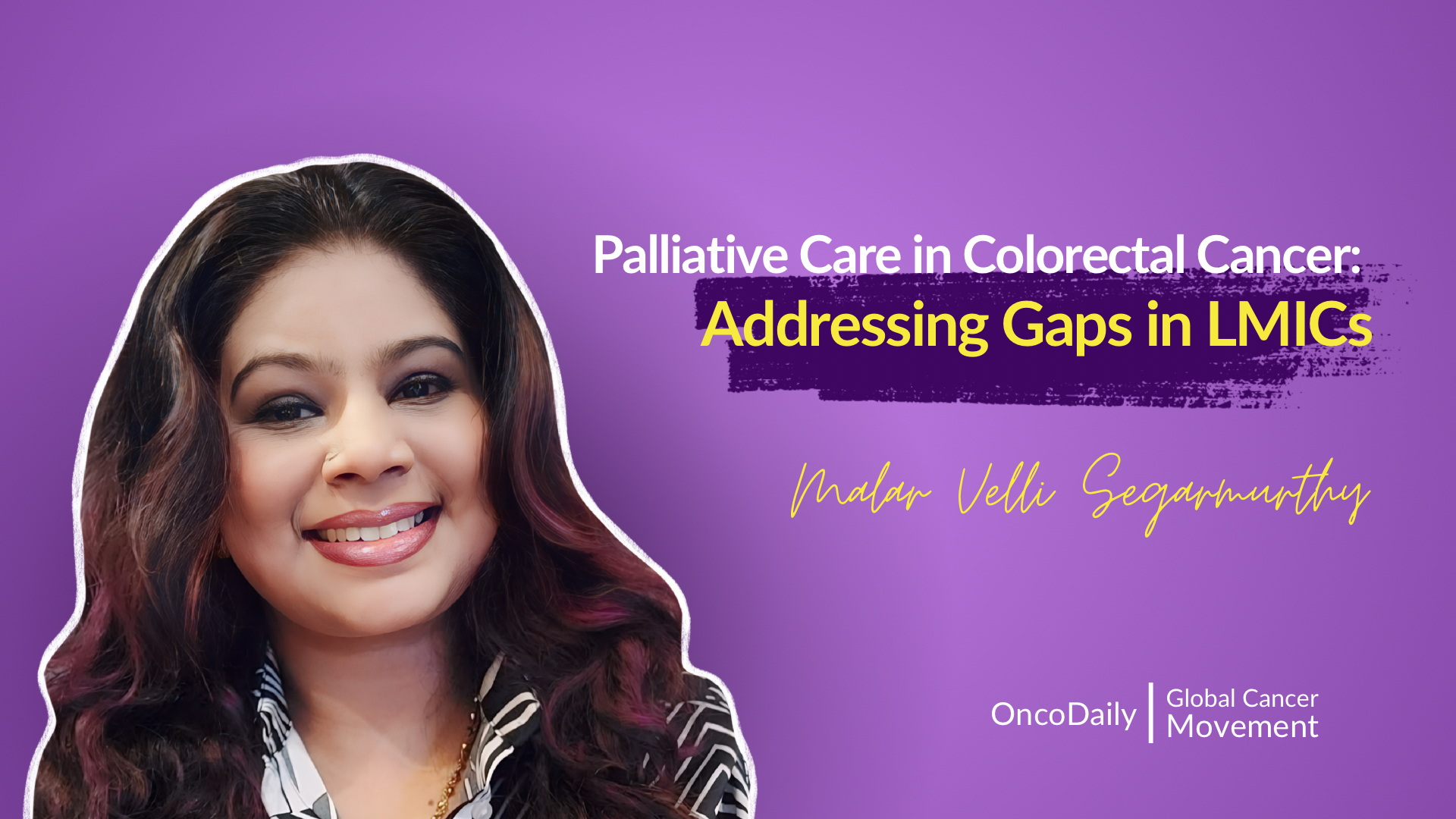In the inaugural event of the Global Cancer Movement, initiated by OncoDaily, Dr. Malar Velli Segarmurthy, a Public Health Physician at the Ministry of Health Malaysia, highlighted the transformative impact of palliative care in colorectal cancer management. Held virtually from December 6-8, 2024, the event brought together global experts to address critical aspects of cancer care.
Dr. Malar Velli Segarmurthy discusses the role of palliative care in colorectal cancer treatment, with a focus on its availability in low- and middle-income countries (LMICs), and specifically in Malaysia. The speaker starts by introducing the concept of palliative care, explaining that it provides support to patients with life-threatening or life-limiting illnesses, addressing not only physical symptoms but also psychosocial and spiritual needs. Palliative care is aimed at improving the quality of life for both the patients and their caregivers, and it can be delivered in a variety of settings, including hospitals, outpatient clinics, nursing homes, and at home.
Dr. Malar Velli Segarmurthy highlights that this type of care can significantly reduce unnecessary hospitalizations, ICU admissions, and overall healthcare costs. Furthermore, it is provided by a range of healthcare workers, not just doctors, and is most effective when introduced early in the disease process.
Dr. Malar Velli Segarmurthy emphasizes the disparity in access to palliative care, particularly in LMICs, where many patients lack access to pain relief and other palliative services. Despite making up 83% of the global population, LMICs consume only 9% of the world’s opioids, leading to significant challenges in pain management and quality of life. The lack of palliative care services in these regions often results in catastrophic financial consequences for patients and families, further hindering economic development.
Dr. Malar refers to a study by the Lancet Commission on Global Access to Palliative Care and Pain Relief, which highlighted that over 80% of the 25.5 million people who die annually with serious health-related suffering live in LMICs where access to palliative care is minimal.
Dr. Malar Velli Segarmurthy then transitions to a discussion of colorectal cancer, which remains a major health issue despite advances in screening, diagnostic tools, and treatments. Colorectal cancer is one of the most common cancers globally, with a particularly concerning increase in incidence among younger individuals under 50. Delays in seeking medical attention and limited access to screening in resource-poor areas exacerbate the problem, leading to premature deaths and long-term health complications for survivors.
Early integration of palliative care is essential, as it addresses the evolving needs of patients as the disease progresses, helping to manage both physical symptoms like pain, fatigue, and nausea, and psychosocial issues like anxiety, depression, and spiritual distress.
Providing holistic care for colorectal cancer patients, which includes addressing not only physical pain but also financial, logistical, and emotional challenges. Palliative care can significantly improve the overall quality of life for these patients and their caregivers. Moving to the specific context of LMICs, the speaker points out that primary care is seen as a cost-effective way to deliver universal health coverage, including palliative care.
However, the integration of palliative care into national health systems remains a challenge, with most primary care systems in LMICs still lacking adequate palliative care services. This gap in services leads to millions of people in LMICs having limited access to care that could greatly improve their quality of life and reduce hospitalizations.
Focusing on a study conducted in Malaysia, a country categorized as upper-middle-income, to explore the availability and accessibility of palliative care services. The study mapped the distribution of palliative care facilities across different regions of Malaysia, revealing significant disparities.
The central region, including urban areas like Selangor and Kuala Lumpur, has better access to a range of palliative care services, while the less developed East Coast and East Malaysia (Borneo) have much fewer options, especially in rural areas. The study also looked at the cost and travel time required for patients to access palliative care, using tools like Google Maps and Room2Rio to estimate distances and travel times.
The findings showed that people in more remote areas, particularly in East Malaysia, often face long travel distances (sometimes over 300 kilometers) to reach the nearest palliative care facility, which poses a significant barrier to accessing care.
Finally, she summarizes the findings of the study, noting that palliative care services are concentrated in the central, more developed regions of Malaysia. Specialist palliative care services are available in hospitals but are sometimes led by doctors without specialized palliative care training. Domiciliary palliative care, which involves nurses visiting patients at home, is limited to a small number of clinics in just a few states. NGOs also provide palliative care in some areas, but their services are mostly concentrated in urban centers, further limiting access for rural populations.
The study found that, on average, Malaysians need to travel about 40 kilometers to access palliative care, but this distance is much greater for those living in less developed regions. Dr. Malar Velli Segarmurthy concludes by emphasizing the need for better distribution of palliative care services across Malaysia to ensure that all citizens, regardless of location or income, have access to quality care.
